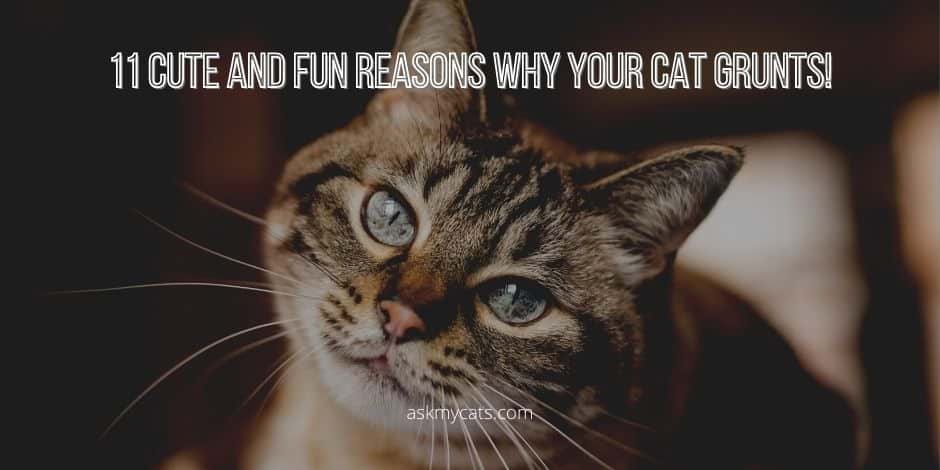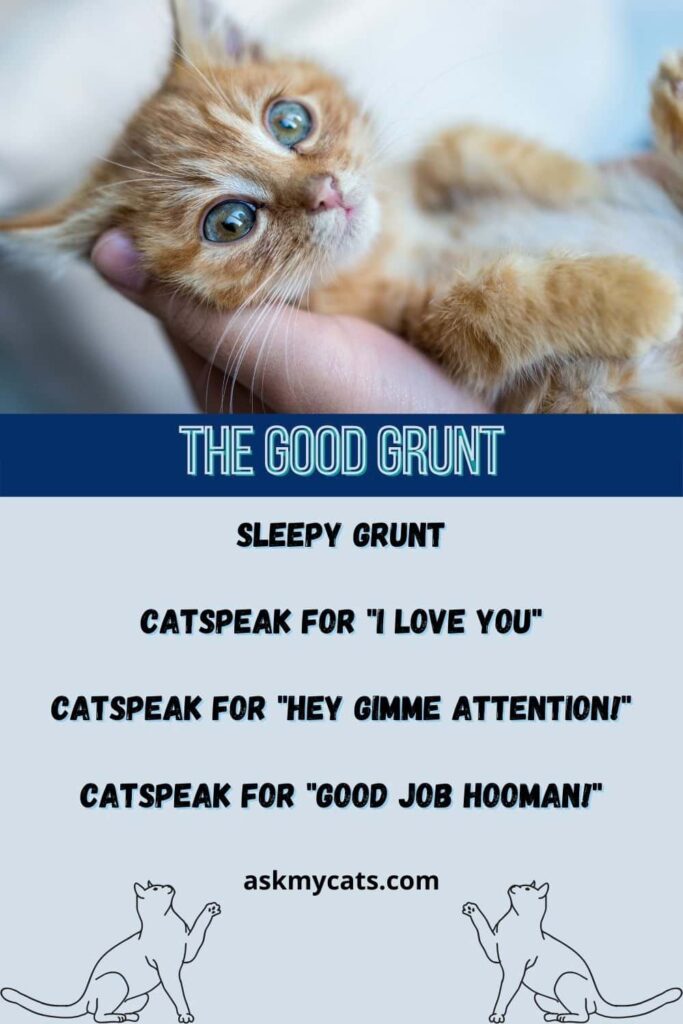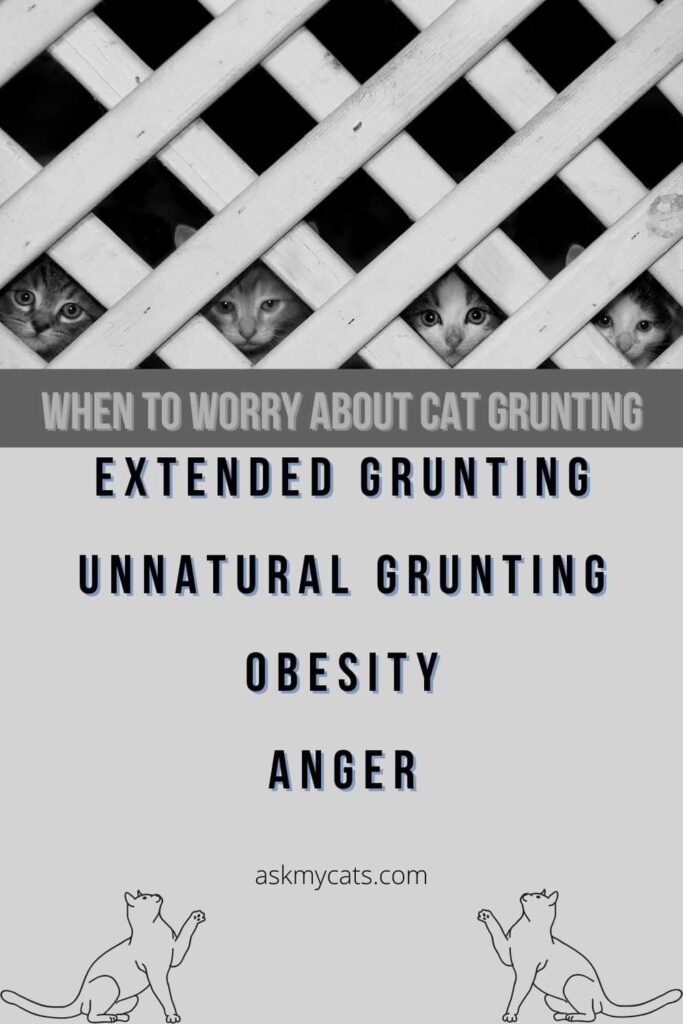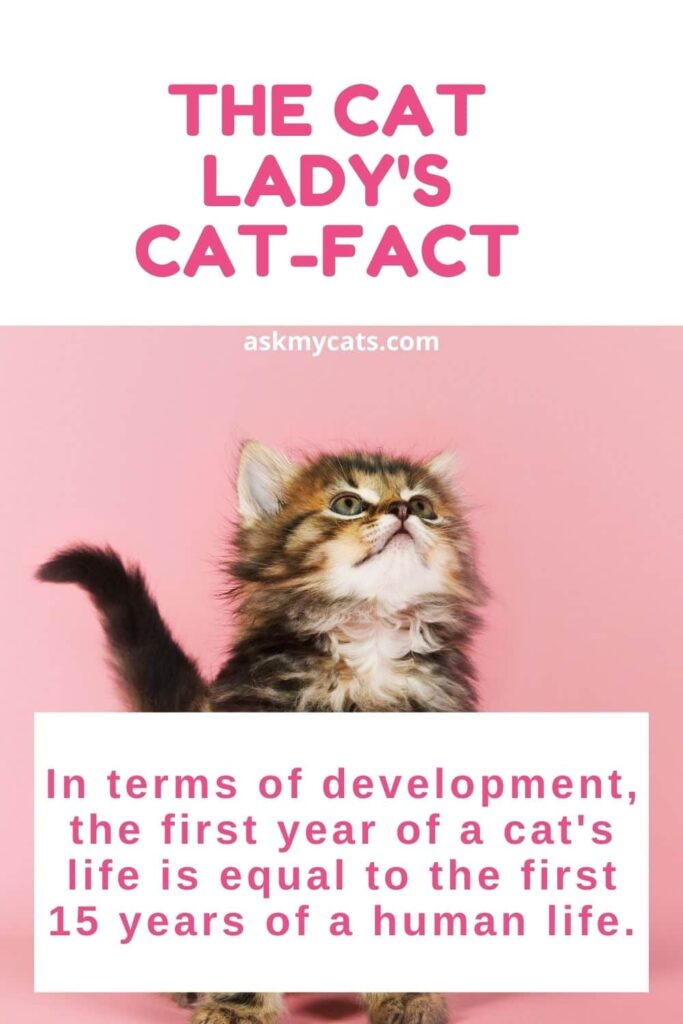Are you, like me, curious about why your cat grunts when it’s sleeping or eating or sometimes just like that? Cats are quirky little creatures, and often do such strangely adorable things that make us sit and wonder what goes on in their heads! In this article, I discuss 11 possible reasons why your cat might be grunting.
If you’ve been a cat parent for a long enough time, I’m sure you’ll agree with me when I say that cats are vocal creatures. Apart from just meowing or purring, there are a lot of cat vocalizations that you get to witness if you’ve had cats for a long enough time.
While cat vocalizations themselves are cute, but strange behaviors, the stranger one amongst them is the grunting noise some cats produce. Is your cat one to grunt from time to time? Well, then you’ve come to the right place!
More often than not, cats grunt as a friendly gesture. Grunting can occur when a cat jumps, eats, plays like the scritches, or simply wants to show you some affection. However, sometimes, grunting can be a subtler sign of some underlying distress.
While there hasn’t been a precise study dedicated to the grunting noise produced by cats, a lot can be understood by just observing the furry little felines when they’re doing some peculiar thing.
The reasons listed here are part observational, a part from conversations with other cat parents, and of course, a few guessed deductions too!


Give Your Cat the Perfect Day
Get the Free Ebook!
11 Reasons Why Cats Might Be Grunting

1. Sleepy Grunt
This is arguably THE CUTEST grunting produced by the furry little babies. It’s a lot like when humans have a good, relaxed sleep, or perhaps a really good dream. Cats are a lot like humans when it comes to relaxed and sound sleeping.
Pro Tip: The next time your little buddy falls asleep in the same room as you, observe them, because the sleepy grunt is the cutest, most heart-warming sight you will get to witness as a cat parent. It is the sound of your baby being relaxed under your care.
2. Catspeak for “I Love You”
Not unlike purring or sighing, even grunting can be your cat trying to say it loves you.
The grunting, mixed with a relaxed body language, and if you’re lucky enough, maybe even a purr, is one of the biggest achievements as a cat parent.
Also, check more details about Why Does My Cat Sigh?
3. Catspeak for “Gimme Attention Hooman!!”
While cats are notorious for being reclusive and introverted, even the most introverted little kitty will need his or her share of attention and cuddles from time to time.
Your cat’s grunting mixed with physical proximity can be a signal that your cat wants your attention.
You heard the cat, missy (or mister). Now drop everything you’re doing and go give your furry baby the attention it deserves!
4. Catspeak for “Good job with the scritches, Hooman!”
If, on a rare lucky occasion, your cat isn’t in the mood to be a cat, it might even appreciate your petting and head scritch.
Cats grunting while being a pet is a signal that they like being a pet, that they appreciate your attention and affection, and that they reciprocate it too. Now, isn’t that heart-warmingly wholesome!
5. Grunting as a Warning before their mighty leap
Some playful, often outdoorsy cats love to jump around here and there. They especially get into the predatory mood when they see a butterfly flopping around, or any other annoying little creepy crawler buzzing on the floor.
In these cases when they want to hunt, cats might grunt as a warning to let you know that their base will now be taking off for a mighty leap on the counter. So, steer clear!
6. Grunting after eating
Now, this particular grunt is a little confusing. You need to keenly observe the body language of your cat for this.
Does your cat look mildly distressed? Well then, the grunt might just be the gurgling of bodily juices within – perhaps gas or constipation or diarrhea.
But do not worry, mild indigestion can happen sometimes but it usually sets itself right within 24 hours. If symptoms persist after 24 hours too, it would be wise to consult a vet.
Does your cat, on the contrary, look pretty relaxed and satisfied? Well then, pat yourself on the back for the great job you’ve done at cat parenting. Your cat is satisfied with the meal, and will now proceed for his royal nap.
Also, check out why do cats make a noise when they jump
7. Extended Grunting
Is your cat grunting for long periods of time every single day?
Chances are there is some underlying problem that is causing distress to your little buddy. Consulting a vet is the best decision in this case.

8. Unnatural Grunting
Does it seem that your cat is putting extra effort into grunt? Grunting usually occurs as naturally as purring.
So, if your furry feline is putting extra effort to produce the grunting sound, it might be trying to communicate its distress to you. In this case, too, consulting a vet is the way to go.
9. Obesity
Has your cat’s weight increased more than usual in the past few days?
Obese cats tend to grunt more, and more often, because of all the extra body weight on the poor little baby.
In cases of obesity, you must consult a vet and an animal nutritionist.
It might be time Garfield replaced that lasagne with some fish salad already!
10. “No talk to me, I’m angry.”
Grunting isn’t all affection and cuddles. In some cases, grunting could also mean that your cat is annoyed or overstimulated.
In that case, give your little kitty the personal space it needs. In due time, the furry buddy will be back grunting for your attention affectionately!
Also, check out why does my cat make noises when he sleeps
Frequently Asked Questions
Why does my cat grunt when he breathes?
Common causes of noisy breathing in cats can include Airway obstruction. Upper respiratory infections. Asthma.
Why does my cat make groaning noises?
They Are In Pain
If your cat is making caterwauling noises out of nowhere, chances are they could be in pain. It can be difficult to tell exactly when your cat is in pain, but if they’re caterwauling after physical trauma or illness, it could be a sign it’s time to visit the vet.
Why does my cat make weird throat noises?
Nasopharyngeal polyps — Any tumor growing in the back of the throat can lead to increased respiratory noise. In cats most commonly these are benign nasopharyngeal polyps. Parasites — Unwelcome parasite infections like feline heartworms and lungworms can wreak havoc on the lungs, resulting in breathing abnormalities.
Should you hiss at your cat?
They don’t like it, because it’s their way of “saying” to somebody they are pissed. If it’s not your cat he will probably back away, or straight up run away. … So just don’t hiss to a cat, unless you don’t like it.
Do cats hold grudges?
Cats don’t hold grudges like humans do because they don’t have the same spectrum of emotions as humans. Instead, cats associate certain actions and behaviors with bad events and good events. Based on this association, they react differently. Many cat behaviors remain mysteries, and their memory is no different.
What is cat Trilling?
Trilling is a high-pitched, chirp-like noise made by cats as a greeting to people or other cats. It is associated with a positive, welcoming vibe.
Why does my old cat make weird noises?
Cats might caterwaul when they are feeling insecure or vulnerable. Cats are known to yowl when they’re feeling psychological stress like insecurity or vulnerability. Some cats are naturally clingy and feel anxious when their human leaves the house — or even the room. They feel abandoned and then the caterwauling begins.
Why is my cat trilling all the time?
The Humane Society suggests that trills, as well as chirps, are used by mother cats to tell their kittens to follow them. If your cat is trilling at you, there’s a good chance they’re requesting the same—follow me!
Why does my cat go into another room and meow?
Cats meow in the other room as a way of communication. Cats meow when they are hungry, need water, or need attention. They can also meow when there is an underlying illness, an injury, undergoing stress, or need help. Most cats meow as an emotional response.
Final Words
Cat grunting, like other cat vocalizations, is a partial mystery. Sometimes it is out of affection, sometimes it is a subtle sign of underlying distress.
Whatever the cause may be 0- you will learn more about your cat by observing him or her and taking active efforts into reading their emotions and behaviors.

If you want to know more about other cat vocalizations, check out my articles:
Wondering Why Your Cat Meows When You Sneeze? 10 Curious And Fun Reasons!
Why Does My Cat Purr Constantly? 5 Absolutely Surprising Reasons To Know!
Does Your Cat Nose Bump You? 4 Reasons Why It’s A Good Sign!
What are some other vocalizations that you have observed in your Mister or Miss Furry Feline? Let me know in the comments section below!
Happy Cat Parenting!
